FINAL CHAPTER OF ADAM’S BIOGRAPHY
In the first section of the Book of Genesis (chapters 1–11), we have world events—
- first the Creation,
- then the Fall,
and now the Flood in chapters 5–9. In chapter 5 we have the book of the generations of Adam through Seth. Cain’s line has been given to us and is now dropped.
It will be mentioned again only as it crosses the godly line. This is a pattern that will be set in the Book of Genesis.
In one sense, chapter 5 is one of the most discouraging and despondent chapters in the Bible. The reason is simply that it is like walking through a cemetery.
God said to Adam, “… For in the day that thou eatest thereof thou shalt surely die” (Gen. 2:17), and they all died who were the sons of Adam. Paul says, “For as in Adam all die …” (1 Cor. 15:22).
Genesis 4 ends with the birth of Seth’s son Enosh, and a statement that people had begun to call on the Lord’s name.
Chapter 5 details the generations from Adam through Seth to Noah, connecting the time of Adam and Seth with the time of Noah and his sons as described in chapter 6.
This sets the stage for God’s judgment of mankind’s pervasive sin in the flood.
Genesis 5:1-20 KJV
[1] This is the book of the generations of Adam. In the day that God created man, in the likeness of God made he him;
[2] Male and female created he them; and blessed them, and called their name Adam, in the day when they were created.
[3] And Adam lived an hundred and thirty years, and begat a son in his own likeness, after his image; and called his name Seth:
[4] And the days of Adam after he had begotten Seth were eight hundred years: and he begat sons and daughters:
[5] And all the days that Adam lived were nine hundred and thirty years: and he died.
[6] And Seth lived an hundred and five years, and begat Enos:
[7] And Seth lived after he begat Enos eight hundred and seven years, and begat sons and daughters:
[8] And all the days of Seth were nine hundred and twelve years: and he died.
[9] And Enos lived ninety years, and begat Cainan:
[10] And Enos lived after he begat Cainan eight hundred and fifteen years, and begat sons and daughters:
[11] And all the days of Enos were nine hundred and five years: and he died.
[12] And Cainan lived seventy years, and begat Mahalaleel:
[13] And Cainan lived after he begat Mahalaleel eight hundred and forty years, and begat sons and daughters:
[14] And all the days of Cainan were nine hundred and ten years: and he died.
[15] And Mahalaleel lived sixty and five years, and begat Jared:
[16] And Mahalaleel lived after he begat Jared eight hundred and thirty years, and begat sons and daughters:
[17] And all the days of Mahalaleel were eight hundred ninety and five years: and he died.
[18] And Jared lived an hundred sixty and two years, and he begat Enoch:
[19] And Jared lived after he begat Enoch eight hundred years, and begat sons and daughters:
[20] And all the days of Jared were nine hundred sixty and two years: and he died.

Genesis 5:1
This is the book of the generations of Adam. In the day that God created man, in the likeness of God made he him;
Corresponds with the phrase, “The Book of the Generation of Jesus Christ,” Who was the Last Adam [Mat. 1:1]. The “Likeness of God” is the “Glory of God” [II Cor. 4:6].
Through the Fall, man lost that glory; however, at the First Resurrection of Life, every Believer will regain that glory [Rom. 8:17.
“The book of the generations of Adam.” This strange expression occurs again only in the beginning of the New Testament, and there it is “the book of the generation of Jesus Christ.”
There are these two books, as we are already seeing that there are two lines, two seeds, and they are against each other. The struggle is going to be long between the line of Satan and the line of Christ, the accepted line.
The line which we are following now is the line through Seth, and it is through this line that Christ will ultimately come.
Chapter 5 is the beginning of a new section in the book of Genesis. It begins with a brief restating of God’s creation of humanity and then provides a specific genealogy of the descendants of Adam through Seth and the succeeding generations to Noah.
Verse 1 describes this section as a book. In the era of the original writing, this most likely meant a clay tablet. This passage describes itself as “the book of the generations of Adam.” The Hebrew word here is ā’dām, used both for the proper name of the first man, as well as the generic term for those who came after him.
The same word used for man or mankind is also translated as Adam when referring to this first man. This, then, is a book of the generations of “man.”
This verse restates the claim of Genesis 1:27 that God created Adam, mankind, in His own likeness. This does not mean that God has some physical form, or that Adam physically resembled God. John 4:24 tells us that God is a spirit. It does mean, however, that God created mankind to stand “in His image.”
As His representatives on earth, we rule and subdue His creation. It also carries the idea that humankind is essentially different from all the animals God made. We share with Him the experience of truth, beauty, meaning, will, and reason.
Finally, the truth that all humans are made in the likeness of God means that all humans have enormous value and are worthy of great respect (James 3:9).
Genesis 5:2
Male and female created he them; and blessed them, and called their name Adam, in the day when they were created.
“And blessed them, and called their name Adam”—not the Adamses, but Adam. He called their name Adam—Eve is the other half of him. Refers to the fact that hedro-sexuality is the created human relationship by God.
The blessing was lost as a result of the Fall, but has been regained in Christ. Adam, in the Hebrew, is the word for humankind in general beside the specific name for the first man.
The previous verse restated the claim of Genesis 1:27: that God made humankind in His own likeness. This verse is specific that “mankind” includes male and female, beginning with Adam and Eve. God blessed our human race and named it.
God did this because He was the Creator. He owned humanity, and He claimed responsibility for it. From that position of power, He blessed us and He claimed His right to name us. Together, we, the human race, became “Adam.” The Hebrew words for Adam and man are exactly the same: ā’dām.
Included in God’s blessing is fertility and reproduction. It’s important to remember that God intended man to multiply and fill the earth prior to the fall (Genesis 1:28). Sex, within the context of God’s intended plan of one man and one woman, is part of His “good” creation.
God enabled humanity to increase in numbers, to thrive as we began to fill up the earth. The following verses will detail a single generational line of God’s blessing.
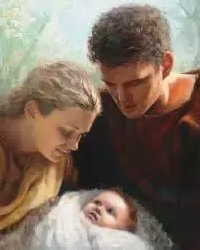
Genesis 5:3
And Adam lived an hundred and thirty years, and begat a son in his own likeness, after his image; and called his name Seth:
When Adam was 130 years old, how old was he?
In other words, when God created Adam, did He create him thirty years old or fourteen or forty-five?
I do not know—anything would be speculation.
And if He created him that old, was he that old?
And of course God could create him any age. May I say, this answers a lot of questions about the age of the earth. When someone says that certain rocks are billions of years old, they just do not know.
Maybe when God created them, He created them two or three billion years old. The important thing here is that when Adam had been here 130 years, he begat a son in his own likeness.
Adam was made in the likeness of God, but his son was born in his likeness.
God originally intended for mankind to procreate “sons and daughters of God” into the world; due to the Fall, sons and daughters could be brought into the world only in the likeness of their original parent, Adam, a product of his fallen nature; it is called “original sin”.
means that Adam no longer had the Image of God; the “likeness” and “image” are now after Satan [Jn. 8:44]. Even though Seth was not the Promised One, still, he represented a ray of hope; through him, rather his line, the Promised One would come.
This verse begins a pattern repeated for the remainder of this chapter. In each of these verses, the next notable member of the generation is listed, along with his age when the next son of Noah’s line was born, and his age when he died.
Adam was 130 when Seth was born. This verse connects to the previous two verses in noting that Adam fathered Seth in his own likeness and after his image. In this way, humans continue the pattern established by God when He made man in His own image.
The likeness of God continues to be passed down from one generation to the next. The long lifespans described here would have also served another important purpose: keeping witnesses to history alive to personally teach future generations.
Looking at numbers given in this chapter, we see that Seth dies only 14 years before the birth of Noah—an extraordinary preservation of the past for the human race prior to the flood.
As we have seen, Seth was not Adam’s firstborn son. Both Cain and Abel were born, grew up, and began their professions before Cain murdered Abel. It is likely Adam and Eve had many, many other children before Seth was born as a replacement for the murdered Abel (Genesis 4:25).
Seth’s line, however, is the one that leads to Noah and, through him, to the rest of the human race as we know it today.
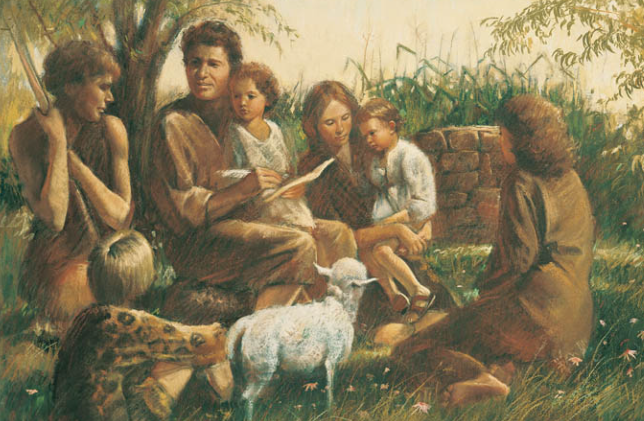
Genesis 5:4
And the days of Adam after he had begotten Seth were eight hundred years: and he begat sons and daughters:
The intimation is, Adam was able to father children, and Eve to conceive, for some 800 years. Exactly how many children they brought into the world we aren’t told. But it had to be many.
The previous verse tells us that Adam was 130 years old when he fathered Seth. Now we learn that Adam, having many other children, lived another 800 years after Seth was born. These long lifespans seem amazing, but make sense when one considers a world free from pollution, most diseases, and most genetic disorders.
It would have been necessary, of course, for Adam and Eve to have many, many children. With no other source of humanity yet on the planet, their children would have married each other, had more children, and then continued to intermarry with members of the ever-expanding family.
Later, God would restrict the practice of marrying close relatives. As humanity continued to suffer the consequences of the fall, genetic diseases would have become more likely, and more problematic.
As a result, close intermarriage carries a much greater risk of birth defects for the offspring. At this time, however, before that genetic pool had become so diverse, that would not have been an issue.
Genesis 5:5
And all the days that Adam lived were nine hundred and thirty years: and he died.
The family history of this, the Heavenly Race, is marked by death; no matter how long a member of the family lived, yet three words attend the name: “and he died”. Now we start through the graveyard.
Adam begat sons and daughters, “and all the days that Adam lived were nine hundred and thirty years”—and what happened?
“And he died.”
After revealing in the previous two verses that Adam was 130 years old when Seth was born and then lived 800 years after the fact, this verse reveals the inevitable math: Adam lived to be 930 years old.
Could that possibly be true?
The Bible’s claim is that these first generations of humans after the garden and before the flood lived extraordinarily long lives, at least by modern standards.
Over the centuries, some scholars have suggested that the ages listed here do not represent actual years as we understand them. Some have suggested these numbers are in months (12 times the actual age), seasons (4 times the actual age), or tenths of years (ten times the actual age).
Others have speculated that there is some form of symbolic or metaphorical intent from the author. The text itself, however, gives no explicit answer one way or the other, nor any particular reason to doubt that these were real people who lived extremely long lives.
Scholars have also speculated that the idealized environment of creation before the flood made it possible for human beings to live so many years. This is not only possible, it coordinates with modern understanding of genetics.
In short, the lifespan of a living creature is far more dependent on its environment than its design. This means it’s also possible, if not likely, that God’s decree to restrict how long He would allow humans to live was specifically meant to limit the damage they could do with their sinful lives (Genesis 6:3).
Genesis 5:6
And Seth lived an hundred and five years, and begat Enos:
Seth fathered a son by the name of Enos at the age of an hundred and five years.
The pattern of this chapter of genealogy is repeated now for the second of the ten generations from Adam to Noah. Seth fathered his son Enosh at 105 years old.
We know from the end of chapter 4 that the birth and life of Enosh was something of a turning point: “At that time people began to call upon the name of the LORD” (Genesis 4:26).
We don’t know exactly what that means, but Enosh helped establish Seth’s line as one characterized by worshipping and depending on God.
Another often-confusing feature of these genealogies are names, or names similar to, those in the lineage of Cain. This is no different from the modern trend of using common names, or derivatives of names.
The line leading from Cain and the line leading from Seth are not only separate, they will end in separate dates. Cain’s line will be cut off by the upcoming flood.
Besides faster population growth, another advantage of these long lifespans is the testimony of each generation. In this early world, it was possible for a child to hear directly from someone who had seen and lived the events of centuries past.
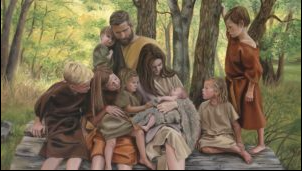
Genesis 5:7
And Seth lived after he begat Enos eight hundred and seven years, and begat sons and daughters:
Seth fathered more sons and daughters eight hundred and seven years after Enos.
Population growth is considered “neutral” in areas with low life expectancy when the average woman has three or four children in her lifetime. Imagine a world with much lower rates of disease or war, cleaner food, water, and air, and a dramatically longer natural lifespan.
It’s not unreasonable to calculate the population of earth exploding at an explosive rate during the generations described in this chapter.
In this verse, it’s stated that Seth lived for “807 years and had other sons and daughters.” More than likely, Seth had an enormous number of sons and daughters.
Due to the long lifespans of these first generations of humans after the garden, the population of the world was likely increasing dramatically.
Each couple could likely bear many children over the span of hundreds of years, seeing those children marry and have children and grandchildren and great grandchildren while they continued to have new children of their own.

Genesis 5:8
And all the days of Seth were nine hundred and twelve years: and he died.
Here we see Seth died after nine hundred and twelve years of life on earth. Remember, he had a son by the name of Enos.
Seth died at 912 years old, living a slightly shorter life than his father, Adam. Despite living more than nine centuries, Seth did eventually die. In fact, a noteworthy aspect of this chapter is that, in spite of their long lives, we’re repeatedly reminded that each of these men died.
Sin had brought death to the world, and death always won. The only apparent exception is that of Enoch, as described in Genesis 5:24.
We’ll also see that human lifespans will begin to decrease. Death will come sooner as the generations get farther removed from Adam, especially following the flood. This is one reason that many scholars attribute the long lives of early man to a pure environment and brand-new, uncorrupted genetics.
Over time, as the effects of the fall continued to work, both the biology of man, and the environment of earth, would make it less and less likely for a man to live beyond a few years.
The long lives shown in this chapter also serve to maintain the value of an oral history. Having eyewitnesses survive for centuries and multiple generations, would have made corruption of history all but impossible.
Genesis 5:9
And Enos lived ninety years, and begat Cainan:
We see here Enos fathered a son named Cainan at the age of 90.
Seth’s son Enosh now fathers Kenan, bringing us to the fourth generation in Adam’s line through Seth. As with other verses in this passage, lifespans and fertility years are long at this point in human history.
The ability of men and women to have large numbers of children, combined with the cleaner environment of the early earth, would have resulted in an explosive growth in population.
In addition, mankind’s original genetics would have been free of corruption, so hereditary diseases would have been rare. Over time, both of these factors—genetics and environment—would have contributed to a drop in mankind’s natural lifespan.
The primary purpose of this passage is to document the genealogy of Noah, as a descendant of Seth. Cain’s lineage, separate from that of his younger brother, will be cut off at the flood.
The other repeated comment, made explicit by the author, is that all of these men died. At this point in the story of Genesis, the fact that mankind experiences death is the primary consequence of the fall.
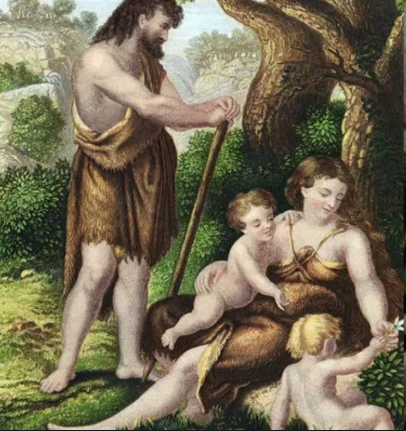
Genesis 5:10
And Enos lived after he begat Cainan eight hundred and fifteen years, and begat sons and daughters:
Enos fathered more sons and daughters eight hundred and fifteen years after he fathered Cainan.
After fathering Kenan at the age of 90, Enosh lived a further 815 years. We know from Genesis 4:26 that it was during Enosh’s lifetime that people began to call on the name of the Lord.
He likely passed this down to Kenan and his other sons and daughters, along with the likeness of God he had inherited from his father.
By modern standards, these lifespans are extraordinary. However, modern science tells us that most living creatures are capable of living, in theory, much longer than they do.
Environment, genetic decay, and other factors limit how long people can live. Early in the history of mankind, these factors would have been much friendlier to life. This would have made extensive lifespans much more probable.
These enormous numbers make it easy to miss the more relevant point, one made over and over in this passage: all of these men died. Long or short, each man’s life is destined to end, one way or the other.
Another interesting effect of these long lives would have been the value of oral history. In modern times, eyewitnesses are at best available for several decades.
In these earlier days, however, it would have been possible to speak with many people who had seen events of centuries past. This huge overlap of generations would have made it all but impossible for historical truths to be lost.

Genesis 5:11
And all the days of Enos were nine hundred and five years: and he died.
Here we see Enos died after nine hundred and five years of life on earth.
The fact that man is destined for physical death is, at this point in human history, the most visible impact of the fall.
Over and over, this passage will repeat the fate common to all men: “he died.” Whether at the end of centuries, decades, naturally or by some mysterious cause (Genesis 5:24), all men are destined to leave this life and come face-to-face with God.
Enosh died at 905 years old, compared to his father Seth at 912 years old and his grandfather Adam at 930 years old. As stated repeatedly in this chapter, these are not the only sons (or daughters) of these men.
That, combined with long lives, means that children of this time had access to an extremely long line of ancestors. By the time we arrive at verse 32, we will see that Noah’s father, Lamech, was born before Adam died.
This means Noah, and his son Shem, had the opportunity to speak with someone who was just one step removed from a direct eye-witness to the origins of mankind!
Genesis 5:12
And Cainan lived seventy years, and begat Mahalaleel:
Cainan fathered a son by the name of Mahalaleel at the age of seventy years of life on earth.
Kenan, the fourth generation from Adam, lived just 70 years before he fathered Mahalalel. In the context of this passage, this seems to be a fairly early fatherhood! Then again, genealogies such as these don’t mention every single child.
On the contrary, it’s said over and over that these men had other children. These are not necessarily a list of firstborn, but are only those in the line from Adam to Noah.
Also interesting about this passage is how the different generations overlap. Based on what’s described in this passage, prior to the flood, humanity had continued access to the very first and second generation of man, up until right before the flood.
In fact, Noah’s father, Lamech, would have been born 56 years before Adam died. In other words, Noah and Shem both lived at the same time as someone who was a contemporary of the very first man.
This is another important aspect of the Genesis genealogies: showing that mankind had an unbroken, clear understanding of their own history prior to the flood.
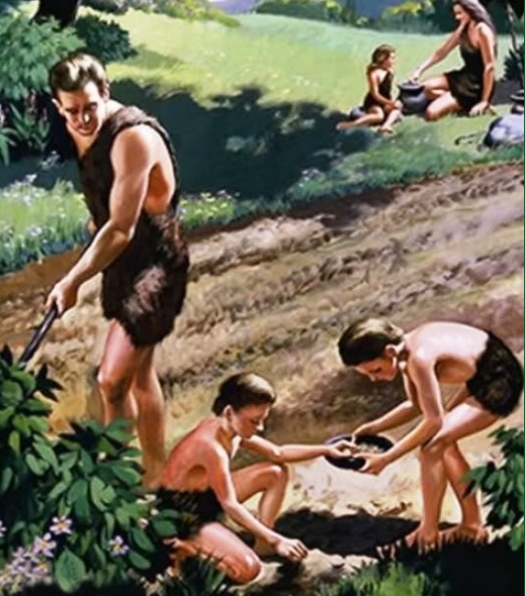
Genesis 5:13
And Cainan lived after he begat Mahalaleel eight hundred and forty years, and begat sons and daughters:
Cainan fathered more sons and daughters after Mahalaleel eight hundred and forty years later.
During Kenan’s 840 years after fathering Mahalalel, he could have fathered many, many other sons and daughters. The long lifespans and extended fertility of this era would have resulted in explosive population growth.
Those lifespans were most likely the result of near-perfect food, air, and water, and our brand-new genes. Over time, genetic disease and the effects of the fall would make it less and less likely for man to live more than a few years.
Beyond that, God seems to have instituted a deliberate shortening of man’s average lifespan, seen just after the flood (Genesis 6:3).
Interestingly, Kenan’s life overlaps that of Adam by nearly 600 years. This is an important point to keep in mind when reading the early chapters of Genesis.
The history of the world, to that point, was not something lost to dozens of prior generations. It was alive in first-hand, or at worst, second-hand form, right up to the moment of the flood.

Genesis 5:14
And all the days of Cainan were nine hundred and ten years: and he died.
Here we see Cainan died after nine hundred and ten years of life on earth.
Kenan, the fourth generation from Adam, dies at the age of 910 years old. The final ages of those listed thus far are as follows: Adam-930, Seth-912, Enosh-905, and Kenan-910.
Based on the ages given in this passage, Kenan lived several hundred years in common with Adam, and quite a few years in common with Noah. This, again, supports the idea that mankind had a clear and unbroken understanding of their own history in the years leading up to the flood.
This makes the sin and evil prevalent in the days of Noah all the more despicable. When the flood came, there were men and women alive who had spoken with Adam and his immediate children.
The real history of man had not been lost, and there were still those alive who knew what the world was like when it was very young. But, as the next two chapters will explain, only Noah and his family were going to be spared from judgment.
Genesis 5:15
And Mahalaleel lived sixty and five years, and begat Jared:
Mahalaleel fathered Jared at the age of sixty and five years of life on earth.
Mahalalel fathered Jared at the relatively spritely age of 65 years old. Jared becomes the sixth in line from Adam. Of the nine patriarchs preceding Noah, Jared will be the last who dies well in advance of the flood.
Enoch will be taken by God in some way, prior to his natural death (Genesis 5:24), while Methuselah and Lamech will die immediately prior to the near-total-destruction of mankind.
Along with Enosh and Kenan, Mahalalel and Jared will also live many years concurrently with Noah. It’s critical to notice that all four of these men lived hundreds of years in parallel with Adam.
In fact, according to this passage, the first patriarch born after Adam’s death is Noah himself. The eyewitness testimony of God, and His relationship to mankind, was still alive up to the moment of the flood.
The long life spans in this chapter are attributed to various factors. Cleaner food, water, and air would contribute greatly to longer lives. In addition, human genes had not been as effected by the corruption of the fallen world.
Particularly after the flood, life expectancies will drop off dramatically. This change also reflects a deliberate act by God, as explained in Genesis 6:3.

Genesis 5:16
And Mahalaleel lived after he begat Jared eight hundred and thirty years, and begat sons and daughters:
Mahalaleel fathered more sons and daughters eight hundred and thirty years after he fathered Jared.
Mahalalel had more sons and more daughters and lived another 830 years after fathering Jared. The fact that he is listed as having additional children is important for several reasons.
First and foremost, it reminds us that the names listed here are not necessarily the firstborn of any of these men.
This passage is meant to trace the lineage of Noah, from Adam. As such, it only lists those names which are in that direct line. Some of these might have been firstborn, while some might have been later.
The idea of these man having other children also supports the idea of a rapid growth in human population. In a modern environment, a population where women average 3 to 4 children each is capable of growing very quickly.
In a scenario where people can have children over several centuries, rather than two or three decades, this means an incredibly fast explosion in population.

Genesis 5:17
And all the days of Mahalaleel were eight hundred ninety and five years: and he died.
Here we see Mahalaleel died after eight hundred ninety and five years of life on earth.
The ages at death of the patriarchs listed in this book of Adam thus far are as follows: Adam-930, Seth-912, Enosh-905, Kenan-910, and now Mahalalel-895. The presence of physical death is, so far, the most obvious consequence of the fall.
Regardless of how long these early patriarchs lived, they all died. The only exception seems to be Enoch, who found himself gone from this life and face-to-face with God all the same (Genesis 5:24). The repetitive comment, “and he died” is no accident.
When one lines up the birth and death dates of these patriarchs, it becomes clear that there is a significant overlap. In fact, other than Enoch, the only men in this line who are not still alive when Noah is born are Adam and his son, Seth!
And, as we will see later on, Noah’s father, Lamech, was born more than 50 years before Adam’s death. This is crucial for understanding how deep the effects of sin were in the pre-flood world.
Despite having eyewitnesses to God’s creation, or their direct descendants, mankind will spiral out of control until God removes nearly everyone (Genesis 6:5–8).
Genesis 5:18
And Jared lived an hundred sixty and two years, and he begat Enoch:
Jared fathered Enoch at the age of a hundred sixty two years of life on earth. Enoch and Abel are the only two men from creation to the flood, with the exception of Noah, listed who lived for God.
There may have been others, but the Bible doesn’t say.
Jared fathers Enoch at the age of 162. Enoch becomes the seventh generation from Adam through the line of Seth. Jared and Enoch will be the last of the patriarchs to depart well in advance of the flood.
The next two men in line, Methuselah and Lamech, will both pass shortly before—or, in the case of Methuselah, possibly when (Genesis 5:27)—God sends His epic judgment to earth.
Given the long lifespans of these patriarchs, most of the men listed died a (relatively) short time after their fathers. Jared and Enoch are the notable exception, in that Enoch will be “taken” by God in some way long before Jared’s death (Genesis 5:24).
The next verses will repeat the common themes of this chapter. Jared will have more sons and daughters than just Enoch, meaning the population of earth must have grown extremely quickly. Also, Jared will die, like all men since the fall.
The only patriarch not explicitly said to die will be Enoch, and even he will be “taken” by God. Regardless of long life, each person is destined to meet God someday.
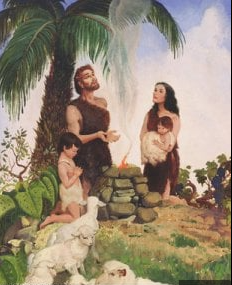
Genesis 5:19
And Jared lived after he begat Enoch eight hundred years, and begat sons and daughters:
Jared fathered more sons and daughters eight hundred years after he fathered Enoch.
Jared fathered more sons and daughters during his 800 years after fathering Enoch. Judging by what we’ll see of Enoch’s life in the next few verses, it’s very possible that Jared (or his father or grandfather) passed on to those sons and daughters what it meant to live in relationship to God.
The fact that Enoch was so close to God might be due to godly parenting on the part of Jared.
On the other hand, Jared’s grandson and great-grandson, Methuselah and Lamech, will both be alive in the years shortly before the flood. At that point in time, the state of mankind is best described as “evil” (Genesis 6:5).
Looking at the lifespans given in this chapter, it stands to reason that many, if not most, of Enoch’s peers were probably not followers of God.
It’s possible, if not likely, that at least a few of Enoch’s brothers and sisters, and certainly many of his nieces and nephews, were killed when God sent destruction to remove that evil.

Genesis 5:20
And all the days of Jared were nine hundred sixty and two years: and he died.
Here we see Jared died after nine hundred sixty two years of life on earth.
The ages at death of those listed in this book of Adam, so far, are as follows: Adam-930, Seth-912, Enosh-905, Kenan-910, Mahalalel-895, and Jared-962.
Whether by coincidence or by design, Jared’s life is the longest (so far) in Genesis, while his son Enoch’s is the shortest, at 365. However, Jared’s record for longevity won’t stand.
His grandson, Methuselah, will become the go-to punchline for old age, living to 965 years.
Just prior to the flood, God will make a deliberate decision to drastically limit human lifespans (Genesis 6:3). This is probably meant to limit the amount of evil man is capable of.
With only a few decades of active life, rather than several centuries, it’s much harder for one man to gain the power required to commit wide-spread carnage. Sadly, as history has shown, this abuse is merely harder, not impossible.
The phrase “and he died” is repeated for every one of the patriarchs leading to Noah, other than Enoch (Genesis 5:24). This is the most immediate effect of the fall: physical death.
This was the main consequence God gave to Adam (Genesis 2:17) regarding the Tree of the Knowledge of Good and Evil, and it is repeated over and over here, for that very reason.
I hope that you have really enjoyed this post,
Please Leave All Comments in the Comment Box Below ↓













Thanks for sharing this expository bible study about Adam.
The first man was created by God and planted in the garden of Eden. I love reading the book of Genesis. it is the book of the beginning that led to all other happenings in the Word of God, unto the coming of Jesus as a baby to the book of Revelation.
I will be coming back frequently to this site to have bible study.
Hello,
You are welcome for the sharing of this information, it is my duty to spread this Good News.
Thanks for your comment and you are more than welcome to visit as much as you like.
May The Lord Bless You,
Jerry
The Bible is considered an Anthology, a collection of writings of various forms that bind the belief that they are part of God’s divine revelation.
These writings include historical writings, hymns, prayers, proverbs, scriptures, parables, essays, poetry, and prophecies. The writings that make up the Bible are traditionally called the “canon” of Scripture.
The canon means that a certain scripture tradition or group of believers sees it as a true representation of “God’s word” or God’s will.
Hello,
Thank you so much for sharing as well as adding to this information. Please feel free to comment on more sections on this website.
Thanks Again,
Jerry
Thank you for this blog post on the Holy bible, genesis 5.
I am always trying to read chapters of the Holy Bible several times per month, to understand it better. It is good to have a website like yours to help me understand it better and to remind me of certain chapters.
Thank you!
Hi,
You are most certainly welcome for this information. We all need some type of routine, as well as, understanding with our study habits.
Thank You For Your Interest,
Jerry
It’s been a long time since I studied this section of Genesis, thank you for sharing and breaking it down so clearly.
I like the thought that every person alive today is possibly a descendant of the sons of Noah.
Do you believe the book of Genesis – the entire book – could have been given to Moses by revelation, directly from God?
Hello,
Thank you for taking the time to comment on this portion of Holy Bible Study.
The answer to your question can be found in 2nd Timothy Chapter 3: Verses 16 Through 17.
Please Have A Blessed Day.
Jerry
I wholeheartedly resonate with the insights presented here.
Through my personal experiences, I have found immense solace, wisdom, and guidance in studying the book of Genesis and exploring the profound stories it contains. The depth of knowledge and spiritual lessons embedded within the text is awe-inspiring, leading to a deeper understanding of our origins and our relationship with a higher power.
Your post not only reinforces the significance of studying the Holy Bible but also encourages me and others to delve into the timeless wisdom it offers. I extend my gratitude to you, the author, for shedding light on this sacred scripture and fostering a deeper connection with our spiritual journey.
Hello Dave,
Thanks for checking out, as well as your support, reading and commenting on this HBS & DwJ Podcast episode. I wholeheartedly agree with your comment.
I am pleased to learn that you find this information encouraging, and thanks for extending your gratitude to me for shedding light on this sacred scripture.
Thank you for being receptive to the information contained in this episode.
Blessings My Friend!